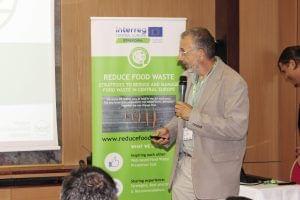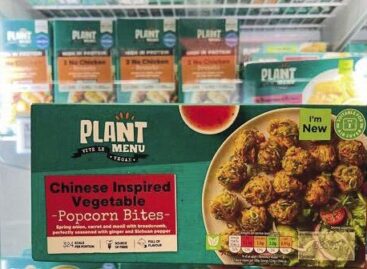Magazine: Food waste conference report
On 11 September the Hungarian Association of Environmental Enterprises (KSZGYSZ)0 hosted a conference on food waste, with speakers from 10 different fields of the sector. The presentations had a connection with the Strategies to Reduce and Manage Food Waste (Strefowa) project. Austria, the Czech Republic, Italy, Hungary and Poland have already realised 16 pilot projects within the framework of the programme. From Hungary the Bay Zoltán Foundation for Applied Research and its project partner, Spar Hungary have joined.

Andrea Koza
PR specialist,
climate change officer
One of the Strefowa pilots is Spar Hungary’s ‘Choose me!’ campaign video, which informs consumers about product use. Since 2017 Spar Hungary has been running a food waste reduction programme with employees, offering expired baked goods and fruits to workers. The retailer also donates food products to the Hungarian Maltese Charity Service.
The National Food Chain Safety Office (NÉBIH) has an awareness raising campaign, called No Leftover (www.maradeknelkul.hu) with a budget of EUR 964,500. On various media platforms the campaign has produced 59 million reaches. Its objectives are teaching environmental consciousness, changing consumer attitudes and cutting food waste. A survey was also part of the programme, and it revealed that per capita food waste is 68kg a year in Hungary, from which 48.7 percent could be avoidable.
In kindergartens and schools more than 1,000,000 children eat the food made by public sector catering service providers every day. InDeRe Food Research and Innovation Institute has conducted a survey on food waste in the kindergartens and schools of Budapest and Pest, Borsod-Abaúj-Zemplén and Komárom-Esztergom counties. It turned out that typically food waste is produced from unserved food (21.63 percent) and food that is served but not eaten (21.25 percent). The study has found that every year 138,000 tons of food is prepared for feeding children in public sector catering, from which 53,000 tons ends up as waste. From the food waste produced, 26,650 tons are reusable per year – this means 35,220,000 portions of food at annual level. What can food makers do? Optimise processes and forecast needs better.
Food traceability solution Te-Food covers the whole supply chain, from manufacturer to consumer. A QR code contains the origin and story of the food product, and this can increase consumer trust in the product. Te-Food’s system is cost-efficient, easy to integrate and the product data uploaded can’t be modified. Biofilter Környezetvédelmi Zrt. engages in sustainable waste management. In 2018 the company collected 5,600 tons of used cooking oil. This activity prevented the emission of 12,300 tons of CO2 – the annual emission level of 2,600 cars! They also collected 7,600 tons of food waste from households.
Then Hungarian Food Bank Association is a member of the European Food Banks Federation. As a non-profit organisation it seeks to collect surplus food and to reduce the environmental food print, and to help people in need with food donations. They cooperate with 350 partner organisations. The food bank saved 11,000 tons of food in the value of HUF 6,472,000 in 2018 and gave it to 300,000 poor people.

Responsible Gastro Hero aims at increasing the number of sustainable restaurants and raising the level of consciousness as regards food waste. Restaurants must meet several criteria to be granted the sustainable restaurant title. These places are facing several problems in managing the food waste they produce. The organisation also runs a campaign for reducing the food waste produced by households, urging people to try to generate as little food waste as possible for a month. Learn more about the conference and the presentations at www.kszgysz.hu. (x)
Related news
Avian influenza has appeared in a new farm in Csongrád-Csanád County
🎧 Hallgasd a cikket: Lejátszás Szünet Folytatás Leállítás Nyelv: Auto…
Read more >Forced paths: trends and decisions in 2026
🎧 Hallgasd a cikket: Lejátszás Szünet Folytatás Leállítás Nyelv: Auto…
Read more >Related news
Veganuary inspires millions of people in the UK
🎧 Hallgasd a cikket: Lejátszás Szünet Folytatás Leállítás Nyelv: Auto…
Read more >Hungarian world first: AI calculator calculates how much a company will lose during the flu season and how much can be saved by using preventive technologies
🎧 Hallgasd a cikket: Lejátszás Szünet Folytatás Leállítás Nyelv: Auto…
Read more >







